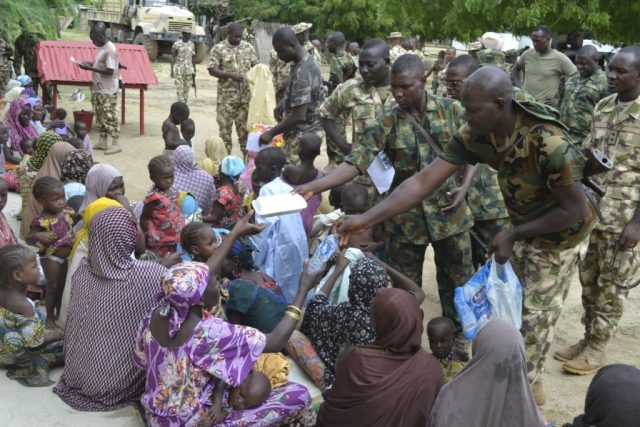Winning Over Locals Key To Military’s Victory Over Insurgency
The counter-insurgency operations in Northeast Nigeria is dependent on the cooperation and support of civilians in the theatre of war.

Reports by human rights organisations, including Amnesty International and the U.S. Department of State on Human Rights Practices in Nigeria, have condemned the military’s targeting of civilians during battles with insurgents.
The reports highlight a troubling aspect of Nigeria’s counter-insurgency campaign, which, if left unchecked, could negatively affect civil-military relationships and jeopardise the entire war efforts, the reports said.
It could also prolong the decade-long conflict and amplify grievances that will increase the vulnerability of the local population and the military, the report said.
On Feb. 14, Amnesty International (AI) revealed that the Nigerian military had burnt down and forcibly displaced entire villages in response to the escalation of attacks by Boko Haram factions.
AI’s report was based on an analysis of satellite imagery to track fires in Bukarti, Ngariri, and Matiri and interviews with villagers it said were forced to flee their homes on Jan. 3 and 5 in Jakana and Mainok in Borno State.
“The men were held incommunicado for almost a month and subjected to ill-treatment, before their release on 30 January 2020,” the report said. Based on interviews with affected villagers in Borno State and satellite data analysis, AI reported that the Nigerian military has continued the pattern of violations, which it has documented throughout the country’s decade-long armed conflict in the northeast.
Osai Ojigho, Director of Amnesty International Nigeria, said “These brazen acts of razing entire villages, deliberately destroying civilian homes and forcibly displacing their inhabitants with no imperative military grounds, should be investigated as possible war crimes.
“They repeat a long-standing pattern of the Nigerian military’s brutal tactics against the civilian population. Forces allegedly responsible for such violations must be suspended immediately and brought to justice,” she said
Although the military denied the findings, other human rights groups supported the report. A subsequent report on Mar. 14 highlighted the plight of about 640 recaptured detainees of Giwa Barracks who were allegedly killed six years ago by the military after Boko Haram fighters attacked Giwa Barracks in Maiduguri and freed several hundred detainees.
Nigerian security forces have won several battles against Boko Haram factions but to win the war and achieve sustainable peace, the government counter-insurgency campaign and strategy need to focus on winning the minds and hearts of the local population.
This is best achieved through the implementation of policies and tactics that are gender-sensitive and respect the cultural, religious and individual values and rights of residents in areas affected by the conflict.
Furthermore, averting civilian casualties and unnecessary detention is a productive and sustainable, long-term, counter-insurgency strategy, that reduces grievances amongst locals which are exploited by violent extremist organizations, and ultimately undermine their recruitment ability.
Nnamdi Chife, a Security Intelligence Analyst believes that if the government invests in winning hearts and minds, it would vital in the containment of terrorism.
Chife noted that illegal detentions of civilians in the North East, in an effort and gather intelligence from prisoners have been the bane of military operations.
During President Muhammadu Buhari’s visit to Maiduguri after Boko Haram killed at least 30 people, injured many and abducted an undetermined number of people. The President told residents of the state that the Boko Haram insurgents or any of their factions cannot carry out attacks without the support of some of the locals.
He explained that the fight against insurgency could not be achieved without good intelligence and the support of the people.
An anonymous government source agreed and said, “People need to feel secure before they can provide information. In Borno, most people that supplied information were either seen as accomplices and the process becomes too cumbersome that people feel safer when they do not give information.
“A more civil approach should be adopted, and people must be assured of their safety. A typical example is of villagers that gave information on the activities of Boko Haram and the following day Boko Haram came back to the village and slaughtered the informants,” the source said.
He added that the army needs to improve on its existing relationship with civilians, especially those in the war zones. Some of the measures include identifying community/religious leaders and periodically sitting down with them to review strategies.
The strategy should also focus on rewarding communities and providing social services such as healthcare, water, electricity and agricultural inputs to establish State legitimacy and gain the cooperation of the populace.
Support Our Journalism
There are millions of ordinary people affected by conflict in Africa whose stories are missing in the mainstream media. HumAngle is determined to tell those challenging and under-reported stories, hoping that the people impacted by these conflicts will find the safety and security they deserve.
To ensure that we continue to provide public service coverage, we have a small favour to ask you. We want you to be part of our journalistic endeavour by contributing a token to us.
Your donation will further promote a robust, free, and independent media.
Donate HereStay Closer To The Stories That Matter




